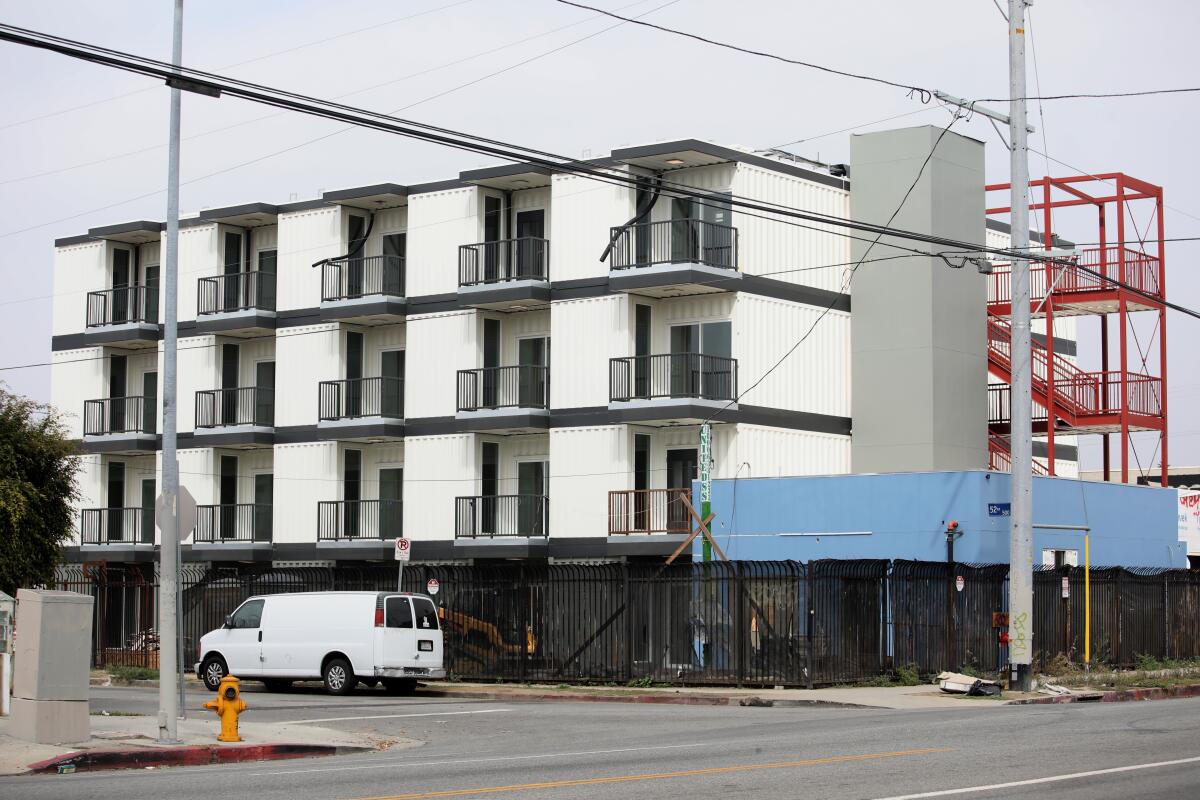Editorial: If California cities want homeless funding, they better stop blocking housing

- Share via
Last week, city and county officials from across the state rallied in Sacramento to demand $3 billion in annual state funding to ease homelessness and build affordable housing. At the same time, the League of California Cities, a lobbying association that represents cities, and some local governments are trying to block bills that would make it easier to build more housing, including affordable housing.
That’s some nerve. Pouring money into homelessness efforts without also making it much faster and cheaper to build housing, especially affordable homes, is a fool’s errand.
The homelessness crisis in California is a direct result of the high cost of housing, and that’s a result of cities and counties failing for decades to permit enough homes to keep up with demand. The shortage has driven up housing costs for everyone, but the lack of cheap housing makes life particularly precarious for people with low income or struggling with mental health, drug addiction or other challenges; if they lose their housing, it can be extremely difficult to find another home they can afford.
To end homelessness, California must build more housing, especially affordable housing. SB 35 has helped speed up affordable developments. It should be continued and expanded.
The efforts to ease the homelessness crisis are stymied by the limited pool of cheap rentals and regulated affordable housing (units built with public money or under state laws that speed up permitting or let developers build bigger projects in exchange for more affordable units). Many cities and counties are working hard to get people off the streets and into shelters, hotels, tiny homes and other temporary arrangements, but too often people get stuck in interim housing because there aren’t enough affordable apartments or units in supportive housing developments to move them into.
California needs to build a lot more housing, for all income levels. But the high cost of development, lengthy approval processes and political uncertainties remain big barriers. That’s why it’s frustrating to see some cities — though certainly not all — and organizations like the League of California Cities ask for more state funding while fighting efforts to reduce those obstacles and create more opportunities for residential development.
All cities in California have a responsibility to make room for more housing to fix the state’s crippling shortage. Even this outspoken coastal town.
The league has opposed or failed to support some of the most important housing reforms passed by the state since 2017, including laws making it easier for homeowners to build accessory dwelling units (ADUs), removing barriers to build homeless housing, streamlining affordable and mixed-income developments, encouraging developers to turn moribund commercial properties into residential projects, and requiring cities to plan and zone for more housing.
League officials argue that those laws often require cities to dedicate staff time and funding to implementing state laws, which makes it harder for them to create local policies to address housing and homelessness. They’re right to a degree. Many cities lack the personnel or expertise to keep up with the changes required, according to a recent analysis. They also say state laws haven’t been effective because housing prices continue to rise and homelessness hasn’t been solved — which, of course, ignores the fact that regulatory changes and the corresponding market response take time.
California’s housing crisis was decades in the making and it will take years to ease it. But new laws are beginning to have an effect. Since 2017 there’s been a building boom of more than 20,000 accessory dwelling units that are often less expensive housing for students, young couples and seniors. Developers have proposed 18,000 units, with three-quarters of them affordable, using Senate Bill 35, a law that prohibits cities from rejecting or shrinking projects that comply with local zoning; the law shaves months or years off the usual approval timeline. Despite the proven success, the league and some cities oppose making SB 35 permanent and expanding its reach.
Local governments are right about the need for ongoing, guaranteed funding for cities and counties to address homelessness. As long as funding fluctuates year to year — and could disappear altogether — officials will be hesitant to commit to long-term investments in homelessness services and affordable housing development. But perhaps city and county officials would find a more receptive audience in Sacramento if they stopped fighting housing laws and started embracing housing development.
More to Read
A cure for the common opinion
Get thought-provoking perspectives with our weekly newsletter.
You may occasionally receive promotional content from the Los Angeles Times.












